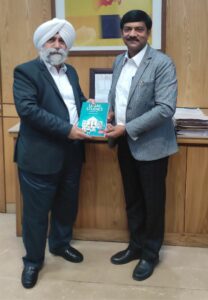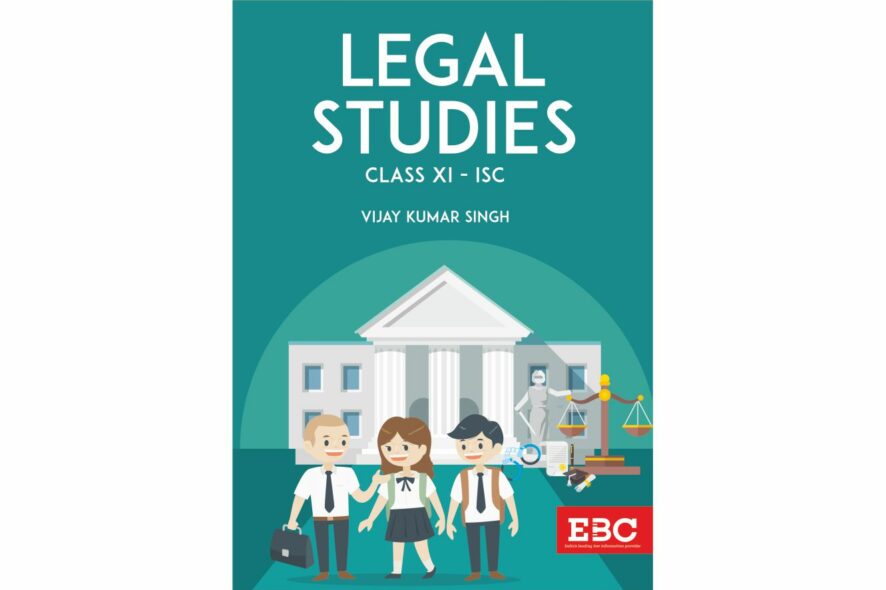A new book Legal Studies Class XI – ISC was released recently. It is a comprehensive book which covers the syllabus of ISC board in its entirety. The language is simple and easy to read and is a must-have for all ISC students who have opted for the Legal Studies paper. This book is written on the basis of ISC syllabus for Class XI; however it will be helpful for general readers interested in learning basic concepts of law.
Dr Vijay Kumar Singh, who is the author of the book recently presented a copy of the book to Justice Talwant Singh, Judge, Delhi High Court. Justice Talwant Singh has written the foreword for this book. A photograph capturing the moment can be seen below:

Book Description
“Ignorantia juris non excusat” is a famous maxim which means ignorance of law is no excuse for breaching the law. Learning about the essential nature of law and the concerned legal systems is useful for every person. Legal Studies by Prof. Vijay Kumar Singh, is a comprehensive textbook on the subject and covers difficult legal language in a simplified manner which is easy to understand and at the same time does not lose its character of being legal.
This book begins with the unit on historical evolution of the Indian legal system followed by covering six key areas of law, i.e. the concept of law and jurisprudence, concept of legal personality, criminal law and procedure, civil law and procedure, family law and fundamental rights. Each of these units have been further subdivided into sub-topics for ease of understanding. At the end of the book, there is a list of suggested project submissions for the learners to explore for their practical and on-ground understanding of various legal situations and problems, and a question bank. A subject index at the end helps seamless maneuvering through the topics and sub-topics.
The subject of legal studies will allow the students to be more aware about the legal concepts/rules and will create an awareness of their rights and responsibilities as citizens. Key attributes of a lawyer are good communication skills, logical reasoning, critical analysis and a clear sense of interpretation. Studying this book on legal studies will aid in all of these.
Extract from the Foreword
I would like to compliment Dr Vijay Kumar Singh for having undertaken this venture of writing a book for the secondary school level students to introduce them to law as a discipline and further, encourage them to take up a formal law course in a university.
―Justice Talwant Singh,
Judge, Delhi High Court
Table Of Contents
Unit I – Historical Evolution of the Indian Legal System
- Law in Ancient India and the Concept of “Dharma”
- Law in Medieval India with Special Reference to the
- Legal System in India Post-18th Century
- Government of India Acts and Framing of the Constitution of India
Unit II – Law and Jurisprudence
- Law and Jurisprudence — An Introduction
- Understanding Civil and Criminal Law in Contrast
- Different Facets of the Constitution
- International Community of Nations
Unit III – Concept of Legal Personality
- Natural Person and Artificial (Legal) Person
- Partnership
- Company
Unit IV- Criminal Law and Procedure
- Substantive and Procedural Criminal Law
- Criminal Justice Administration
- Major Substantive Criminal Law: Indian Penal Code
- Juvenile Justice Laws
Unit V – Civil Law and Procedure
- Substantive Civil Law
- Hierarchy of Civil Courts
- General Civil Procedure
- Enforcement of Substantive Civil Law
Unit VI – Family Law
- Law Relating to Marriage
- Law Relating to Divorce and Maintenance
- Adoption of Children
- Violence Against Women
Unit VII – Fundamental Rights
- Classification of Fundamental Rights
- The State
- Judicial Review
- Article 21—The Right to Life and Personal Liberty
- Right to Constitutional Remedies
- Restrictions on Fundamental Rights
Legal Studies: Syllabus
Aims
Paper-I — Theory
Paper-II — Project work
Project guidelines for teachers
Question Bank
Sample paper of Class XI
Sample questions: Unit wise
Subject Index
About the Author
Dr Vijay Kumar Singh
B Sc, LL M, NET, Ph D (Law), MBA (HR)
At present Dr Vijay Kumar Singh is a Professor and Dean at the UPES School of Law, Dehradun. Immediately before this position, he headed the School of Corporate Law for three years as Associate Professor in Indian Institute of Corporate Affairs (IICA), a think-tank and capacity building institute under the Ministry of Corporate Affairs, Government of India. Dr Singh has also worked with the Competition Commission of India (CCI) as Deputy Director (Law). During this stint for about five years with the competition regulator of India, Dr Singh worked in the Legal Division and has been actively involved with the capacity building and advocacy activities of the Commission including international cooperation. Dr Singh is a doctorate in law with basic degree in science followed by degrees in law with Gold Medals in his LL B and LL M examinations from RTM Nagpur University. Dr Singh has authored a book titled Corporate Power to Corporate Crimes: Understanding Corporate Criminal Liability in India.
Purchase Link
A copy of the book can be bought here: Link






